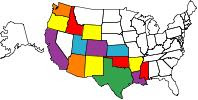For "Winged Wednesday":
The Fool Hen: Spruce Grouse"When Spruce Grouse is approached by a predator, it relies on camouflage and stillness to stay hidden, often allowing people to approach within a few feet before exploding into flight. This behavior has earned the species the nickname of “fool hen.” (Other birds that rely on cryptic coloration include American Woodcock and Snowy Plover.)
Spruce Grouse are at home in the trees and prefer to walk along tree limbs or on the ground rather than fly. Each fall they grow "snowshoes"—short fleshy bristles called pectinations—on their toes, which help support the bird on snow and probably help to grip slippery branches as well. These bristles are shed each spring.
True to its name, the Spruce Grouse’s chief food is conifer needles. This is the species’ only food source during the winter, when the birds’ gastrointestinal tract enlarges to help digest the tough foliage. Spruce Grouse shift to a more varied diet in the breeding season, adding berries, assorted green plants, fungi, and some insects to their diet.
While Spruce Grouse are secure in the majority of their range, the species is in decline in northern New York and New England, where harvest of the mid- to late-successional coniferous forests and coniferous forested wetlands is causing fragmentation and loss of the grouse’s preferred habitat. (Other grouse, such as the Greater Sage-Grouse, are in steep decline. You can help.)"
_______
 BirdNote: Why are blackbirds black?
BirdNote: Why are blackbirds black?
Upcoming Shows
Buffleheads
SUNDAY
Buffleheads in Winter
by Chris Peterson
LISTEN NOW ►
Crested Caracara
MONDAY
Crested Caracara
by Dennis Paulson
LISTEN NOW ►
Anna's Hummingbird
TUESDAY
Hummingbirds -
To Feed or Not to Feed?
by Bob Sundstrom
LISTEN NOW ►
South Polar Skua
WEDNESDAY
South Polar Skuas -
Bullies of the Oceans
Featuring Tom Johnson, seabird researcher
LISTEN NOW ►
Marbled Godwit
THURSDAY
Why Birds Stand
On One Leg
by Frances Wood
LISTEN NOW ►
Boreal Owl
FRIDAY
Northern Forest Owls -
Coming South this Winter?
by Bob Sundstrom
LISTEN NOW ►
SATURDAY
Reading from "Refuge"
Featuring Terry Tempest Williams, author
LISTEN NOW ►
______
On This Day:
The mystery of the Mary Celeste, Dec 4, 1872:
"The Dei Gratia, a small British brig under Captain David Morehouse, spots the Mary Celeste, an American vessel, sailing erratically but at full sail near the Azores Islands in the Atlantic Ocean. The ship was seaworthy, its stores and supplies were untouched, but not a soul was onboard.
On November 7, the brigantine Mary Celeste sailed from New York harbor for Genoa, Italy, carrying Captain Benjamin S. Briggs, his wife and two-year-old daughter, a crew of eight, and a cargo of some 1,700 barrels of crude alcohol. After the Dei Gratia sighted the vessel on December 4, Captain Morehouse and his men boarded the ship to find it abandoned, with its sails slightly damaged, several feet of water in the hold, and the lifeboat and navigational instruments missing. However, the ship was in good order, the cargo intact, and reserves of food and water remained on board.
The last entry in the captain's log shows that the Mary Celeste had been nine days and 500 miles away from where the ship was found by the Dei Gratia. Apparently, the Mary Celeste had been drifting toward Genoa on her intended course for 11 days with no one at the wheel to guide her. Captain Briggs, his family, and the crew of the vessel were never found, and the reason for the abandonment of the Mary Celeste has never been determined."
---------
"The Bermuda Triangle is a mythical section of the Atlantic Ocean roughly bounded by Miami, Bermuda and Puerto Rico where dozens of ships and airplanes have disappeared. Unexplained circumstances surround some of these accidents, including one in which the pilots of a squadron of U.S. Navy bombers became disoriented while flying over the area; the planes were never found. Other boats and planes have seemingly vanished from the area in good weather without even radioing distress messages. But although myriad fanciful theories have been proposed regarding the Bermuda Triangle, none of them prove that mysterious disappearances occur more frequently there than in other well-traveled sections of the ocean. In fact, people navigate the area every day without incident."
_______
Psychiatrist reports on the phenomenon of shell shock, Dec 4, 1917:
"Well-known psychiatrist W.H. Rivers presents his report The Repression of War Experience, based on his work at Britain's Craiglockhart War Hospital for Neurasthenic Officers, to the Royal School of Medicine, on this day in 1917. Craiglockhart, near Edinburgh, was one of the most famous hospitals used to treat soldiers who suffered from psychological traumas as a result of their service on the battlefield.
By the end of World War I, the army had been forced to deal with 80,000 cases of "shell shock," a term first used in 1917 by a medical officer named Charles Myers to describe the physical damage done to soldiers on the front lines during exposure to heavy bombardment. It soon became clear, however, that the various symptoms of shell shock?including debilitating anxiety, persistent nightmares, and physical afflictions ranging from diarrhea to loss of sight, were appearing even in soldiers who had never been directly under bombardment, and the meaning of the term was broadened to include not only the physical but the psychological effects produced by the experience of combat." Now known as Post-traumatic stress disorder (PTSD)
_______
Yesterday:
After the disturbed sleep in the hospital the night before, I was able to get a good night's sleep in my own bed, and wake up refreshed today.













3 comments:
Glad to hear you had a good sleep, hope you're feeling better.
If you are not really sick, going to the hospital will make you sick!! Glad that you are OK, and back home. Good for you for checking yourself out. More of us should take charge of their own medical treatments or lack of them. Bet the critters missed you.
Thank you for your comments, Sandra and DD.
Yes, Sandra, being home always makes one feel better.
DD, I don't know if the critters missed me, Ray took good care of them for me.
I couldn't believe the waste that goes on in the hosptials, and Medicare has to pay for that.
Apart from getting away from that germ ridden place, I didn't want to add to the National Debt!!
Happy Tails and Trails, Penny
Post a Comment